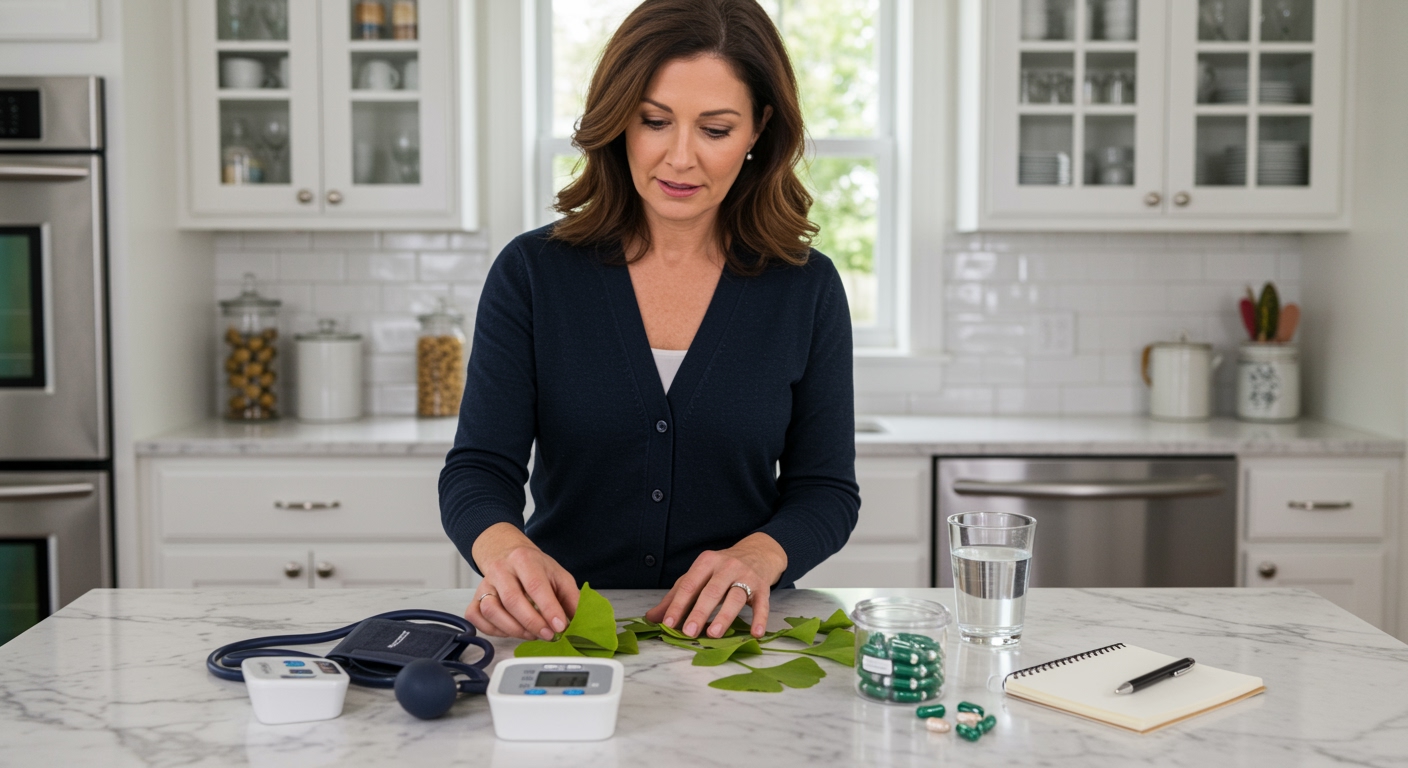✪ Key Takeaway: Ginkgo biloba does not effectively raise low blood pressure and may actually lower it further in some people.
Introduction
You walk into a health store looking for something to boost your low blood pressure, and the clerk suggests ginkgo biloba.
Many people with hypotension wonder if this ancient herb can help raise their blood pressure to healthier levels.
Hi, I’m Abdur, your nutrition coach, and today I’m going to explain whether ginkgo biloba is actually good for low blood pressure and what the science really shows.
What Does Ginkgo Actually Do to Blood Pressure?
Ginkgo biloba works by dilating blood vessels and improving blood flow throughout your body.
This mechanism sounds helpful for circulation, but it creates a problem for people with low blood pressure.
When your blood vessels become wider, your blood pressure typically decreases rather than increases.
Think of it like opening a garden hose nozzle wider – the water pressure drops even though more water flows through.
Research shows that ginkgo contains flavonoids and terpenoids that specifically target the smooth muscle cells in blood vessel walls.
These compounds cause the muscles to relax, which makes the vessels expand and reduces the pressure inside them.
For someone with already low blood pressure, this vasodilation effect can make symptoms like dizziness and fatigue even worse.
✪ Fact: Ginkgo biloba can reduce both systolic and diastolic blood pressure by 5-10 mmHg in some individuals.
What Does the Research Say About Ginkgo and Blood Pressure?
Multiple studies have examined ginkgo’s effects on blood pressure, and the results are consistently clear.
A major clinical trial published in the American Journal of Hypertension followed over 3,000 participants for six years.
The researchers found that ginkgo biloba reduced blood pressure rather than raising it, particularly in people who already had normal or low readings.
Another study specifically looked at people with hypotension who took ginkgo supplements for eight weeks.
The participants experienced worsening symptoms including increased dizziness, fatigue, and episodes of feeling faint.
The research shows that ginkgo works by blocking calcium channels in blood vessel walls, which prevents the vessels from contracting normally.
This mechanism is exactly the opposite of what someone with low blood pressure needs – they need their vessels to contract more effectively, not relax further.
✪ Note: No published studies show ginkgo biloba effectively raising blood pressure in people with hypotension.
Why Do People Think Ginkgo Helps Low Blood Pressure?
The confusion comes from ginkgo’s reputation as a circulation booster.
Many people assume that better circulation automatically means higher blood pressure, but this is not how your cardiovascular system works.
Improved circulation means blood flows more easily through your vessels, which actually reduces the pressure needed to pump blood around your body.
Marketing materials for ginkgo supplements often emphasize benefits like increased energy and reduced fatigue.
People with low blood pressure experience these same symptoms, so they naturally think ginkgo might help their condition.
However, the energy boost some people feel from ginkgo comes from improved blood flow to the brain, not from increased blood pressure.
This temporary cognitive enhancement can mask the fact that your blood pressure might actually be dropping further, creating a false sense of improvement.
✪ Pro Tip: Better circulation and higher blood pressure are not the same thing – one can improve while the other decreases.
What Are the Risks of Taking Ginkgo with Low Blood Pressure?
Taking ginkgo when you have low blood pressure can create several serious health risks.
The most immediate danger is experiencing more frequent episodes of dizziness, lightheadedness, or fainting.
These symptoms become more pronounced because ginkgo can drop your already low blood pressure by an additional 5-15 mmHg.
Ginkgo also has blood-thinning properties, which means it reduces your blood’s ability to clot properly.
When combined with low blood pressure, this creates a dangerous situation where even minor injuries could lead to excessive bleeding.
If you take medications for any condition, ginkgo can interact with them in unpredictable ways, especially blood pressure medications, blood thinners, and diabetes drugs.
The herb can also cause side effects like headaches, stomach upset, and skin reactions that become more severe when your blood pressure drops too low.
✪ Note: Always consult your doctor before taking ginkgo, especially if you have hypotension or take any medications.
What Actually Helps Raise Low Blood Pressure?
Instead of ginkgo, focus on proven strategies that actually increase blood pressure safely.
Increasing your salt intake moderately can help your body retain more fluid, which raises blood volume and pressure.
Drinking more water throughout the day provides the same benefit – more fluid in your system means higher blood pressure.
Wearing compression stockings helps push blood from your legs back to your heart, improving circulation and raising pressure.
Regular exercise, particularly activities that work your leg muscles, strengthens your cardiovascular system and helps maintain healthy blood pressure.
Eating smaller, more frequent meals prevents the blood pressure drops that often happen after large meals.
If lifestyle changes are not enough, your doctor can prescribe medications like fludrocortisone or midodrine that specifically raise blood pressure through different mechanisms than herbs like ginkgo.
✪ Pro Tip: Simple lifestyle changes like increasing salt and water intake are often more effective than supplements for low blood pressure.
The Bottom Line
Ginkgo biloba is not good for low blood pressure because it actually lowers blood pressure further through its vessel-dilating effects.
When dealing with health conditions, what seems logical is not always what science proves to be true.
I would love to hear about your experiences with low blood pressure management or any questions you have about natural approaches to this condition – please share your thoughts in the comments below.
References
At NutritionCrown, we use quality and credible sources to ensure our content is accurate and trustworthy. Below are the sources referenced in creating this article:





